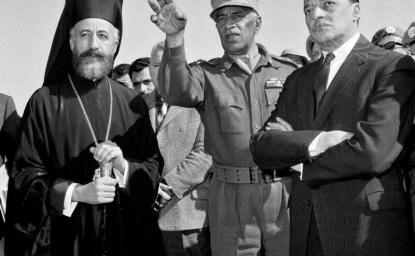From Newsweek:
Archives slowly yielding their secrets
There is much we still don't know–and may never know–about the Cold War. But
once-secret documents are providing a glimpse into key events and showing that
some of what we do know–or think we know–is wrong. Among the findings:
Moscow secretly deployed 100 nuclear warheads in Cuba during the 1962 missile crisis, making the era's most dangerous standoff even scarier in retrospect.
President Eisenhower in 1957 gave U.S. military commanders advance permission
to use nuclear weapons if they were in danger of being overwhelmed by a Soviet
attack and could not reach him.
East-bloc archives have provided the most important new revelations, showing
that communism wasn't a monolith:
Stalin reluctantly approved North Korea's June 1950 attack on the South (Kim Il Sung pestered him with 48 telegrams), believing the United States would not respond militarily. Stalin may have been motivated more by intramural competition with Mao Zedong, newly victorious in China, than by the global struggle with the United States. U.S. officials thought the attack was a Soviet foray that had to be met head on, a misjudgment that led to America's rearmament and eventual involvement in Vietnam.
In many other instances, Moscow's clients called the tune (or tried to), says
Christian Ostermann, director of the Woodrow Wilson Center's Cold War
International History Project:
East German leader Walter Ulbricht was the driving force behind the Berlin
Wall, not a hesitant Soviet Premier Nikita Khrushchev.
Former Polish leader Wojciech Jaruzelski has long maintained he imposed martial
law in 1981 to forestall a Soviet invasion. A Soviet general's diary indicates
the opposite: Jaruzelski pleaded fruitlessly for Moscow to intervene, fearing
he could not handle the challenge posed by Solidarity alone.
But the communist threat was no chimera:
The U.S. Venona code-breaking project and KGB archives belatedly removed any
doubt that dozens of Moscow spies penetrated the U.S. government and the
scientific community. While not every U.S. communist in the '30s and '40s was a
spy, the U.S. party actively helped the Soviet Union. But Joe McCarthy isn't
vindicated. By the time he began sounding off on the issue, Moscow had already
cut ties to U.S. Communists. "What is vindicated is the much broader and more
general . . . anticommunism of the postwar period," says historian John Haynes.
Also vindicated: fears about KGB dirty tricks. The Sword and the Shield, a new
book based on secret KGB archives, details how Moscow tried to smear U.S.
leaders ranging from Martin Luther King Jr. to President Reagan, obsessed over
famous Soviet dissidents, and planned sabotage in America and Europe. -Warren
P. Strobel

Cold War International History Project
The Cold War International History Project supports the full and prompt release of historical materials by governments on all sides of the Cold War. Read more




